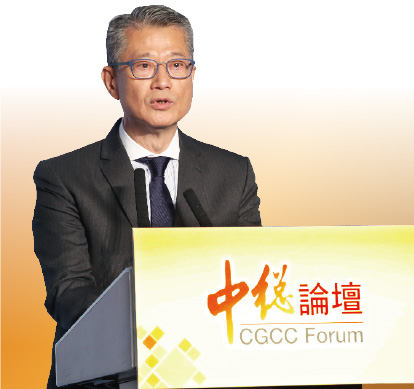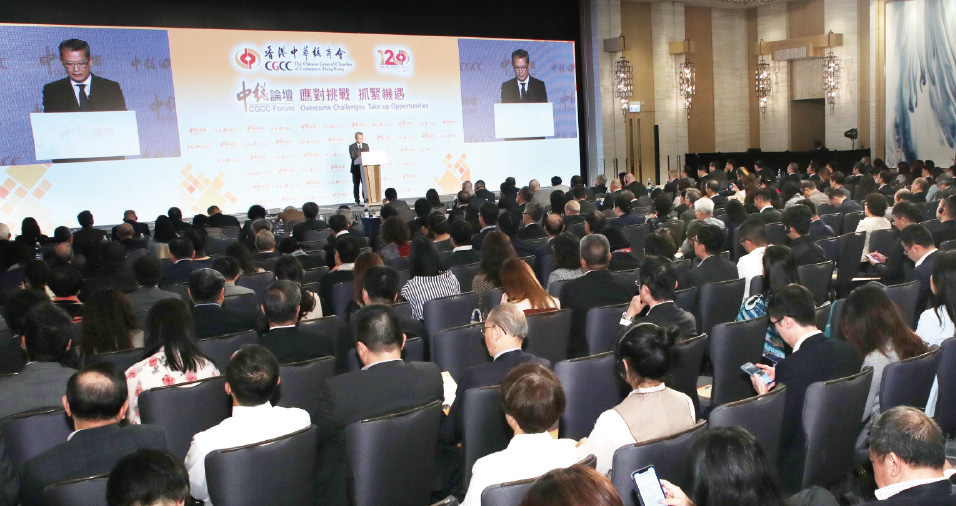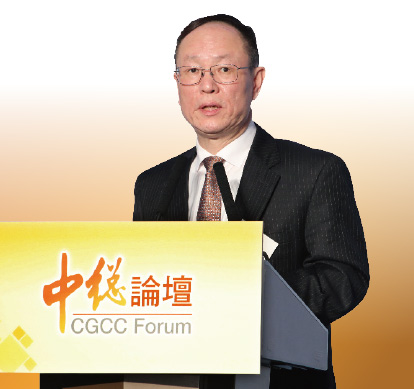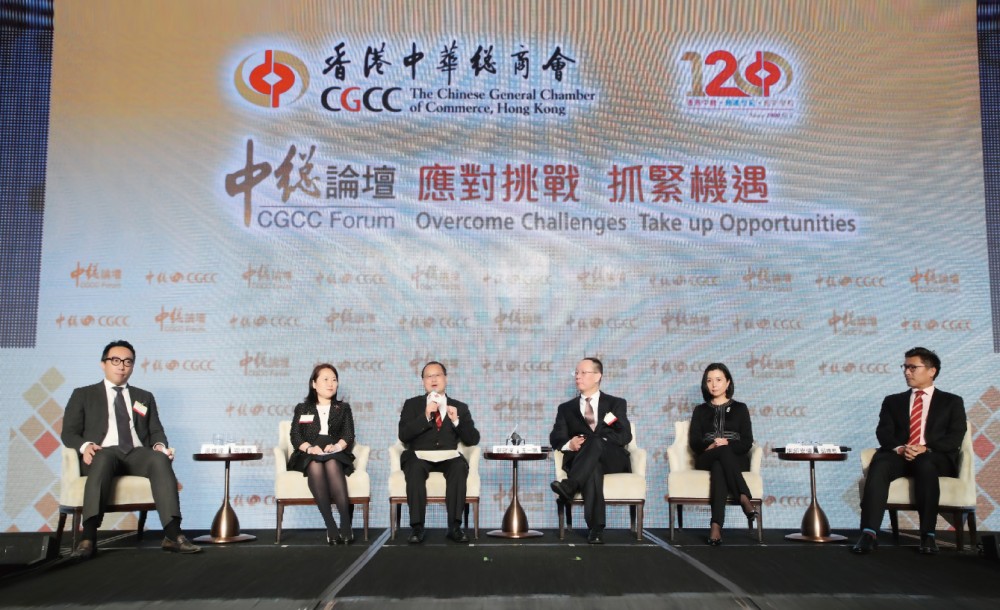The amendment bill has caused social controversy and had a severe impact on all businesses, industries and levels of society. While the future remains unclear, Hong Kong’s development of regional market cooperation continues to exhibit great potential for growth. To mark the start of the new year, CGCC Forum has invited government officials and expert scholars to give in-depth analyses and explore the challenges and opportunities for the economies of the Mainland and Hong Kong arising from the global economic and political situation, as well as to discuss how to expand further market coverage in the context of current economic and social trends.

Paul Chan: Helping SMEs cope with the economic downturn
 Paul Chan, Financial Secretary of HKSAR, said that the downturn in global economic growth over the last year and the volatility in US-China trade relations mean that Hong Kong faces a forbidding range of peripheral trends. Looking further ahead into 2020, he expects to see a slowdown in all the major economies, demonstrating that the global economic revival was far from comprehensive and is still subject to a great deal of uncertainty.
Paul Chan, Financial Secretary of HKSAR, said that the downturn in global economic growth over the last year and the volatility in US-China trade relations mean that Hong Kong faces a forbidding range of peripheral trends. Looking further ahead into 2020, he expects to see a slowdown in all the major economies, demonstrating that the global economic revival was far from comprehensive and is still subject to a great deal of uncertainty.
In addition to peripheral factors, local social events and eruptions of violence have had a major impact on Hong Kong’s economy. Chan noted that if this state of affairs continues, Hong Kong’s tourist industry, private consumption and investment will all struggle to recover, and may further weaken confidence in Hong Kong within the international community and among investors.
The SAR government initiated a package of support measures worth HKD2.5 billion to help businesses open up markets, and also injected capital into special funds to help develop brand upgrades and transitions and expand the domestic consumption market, as well as market promotion funds aimed at SMEs; the government has also scaled up financial assistance to help Hong Kong-based companies develop new markets and seek out new business opportunities.
Chan’s view is that, as the financial system and linked exchange rate system have both remained stable and resilient over the last six months, and the “one country, two systems” model continues to be effectively implemented, Hong Kong will maintain its position as a global financial centre and one of the best places in world to do business. Many international trade organizations still give highly favourable assessments of Hong Kong’s freedom and business environment, and he anticipates that business and industry will seize the opportunities presented by the Mainland market and make a unique contribution to the country’s development.

Wang Yiming: Mainland economic growth will focus on quality
 Wang Yiming, Deputy Director of the Development Research Centre of the State Council, commented that Mainland enterprises are increasingly focused on developing new markets, with exports to both Southeast Asia and the European Union growing. China increased the strength of its counter-cyclical regulation and adopted policies to maintain the stability of its currency, with the result that whole-year economic performance was stronger than originally predicted. Market data shows that mainland Chinese GDP increased by 6.1% year on year in 2019.
Wang Yiming, Deputy Director of the Development Research Centre of the State Council, commented that Mainland enterprises are increasingly focused on developing new markets, with exports to both Southeast Asia and the European Union growing. China increased the strength of its counter-cyclical regulation and adopted policies to maintain the stability of its currency, with the result that whole-year economic performance was stronger than originally predicted. Market data shows that mainland Chinese GDP increased by 6.1% year on year in 2019.
The slowdown in the Chinese economy has been markedly smaller than in other economies, and Wang believes that this demonstrates the resilience of China’s economy. Looking ahead to future economic trends in the Mainland, he believes that ongoing uncertainty in the global economy means that the government cannot overlook the importance of counter-cyclical regulation and must continue with structural reforms to increase the quality of Mainland economic development and ensure that country is able to maintain strong growth momentum and international competitiveness for some time to come. Wang stressed that given current trends, it will be difficult to maintain 6% growth, but the quality of economic growth will nevertheless be key.
Wang went on to point out that the Mainland economy will also benefit from a number of favourable factors this year, including greater ability to adapt to US-China trade frictions, the comprehensive implementation of measures to cope with external shocks, and the gradual effects of tax cuts and cost reductions. Moreover, World Bank reports showed that China made huge leaps in terms of its business environment and innovation index rankings last year, reflecting the changes brought about by reforms.

Zhihuan E: Hong Kong’s financial foundations are sound
 Zhihuan E, Chief Economist of the Bank of China (Hong Kong), noted that the International Monetary Fund (IMF) forecasts slower growth in the world’s two largest economies, the US and China. She believes that the challenges to global economic growth will be bigger than the opportunities in 2020, while Hong Kong, as a small, open economy, will struggle to avoid the effects of the global economic slowdown.
Zhihuan E, Chief Economist of the Bank of China (Hong Kong), noted that the International Monetary Fund (IMF) forecasts slower growth in the world’s two largest economies, the US and China. She believes that the challenges to global economic growth will be bigger than the opportunities in 2020, while Hong Kong, as a small, open economy, will struggle to avoid the effects of the global economic slowdown.
Hong Kong’s economy experienced negative growth last year for the first time in a decade, but the financial markets remain stable. From the perspective of the stock market, the Hang Seng Index rose by 9.1% over the whole year, while the Hong Kong Stock Exchange held on to its position as the global number one for IPOs. Despite a difficult exchange rate situation, the HKD remains essentially stable, and there has been no large-scale outflow of capital. This factors are largely due to the sound foundations of Hong Kong’s financial markets, which continue to improve their ability to withstand external shocks.
E believes that Hong Kong will continue to benefit from significant fundamental advantages. As the effects of the US-China trade dispute and the Brexit crisis are alleviated, and local unrest resulting from opposition to the amendment bill draws to an end, the Hong Kong economy is likely to remain stable this year, and may even see a slight rebound.
Looking ahead to future opportunities, E commented that the continued opening up of Mainland financial markets, combined with the development of the Guangdong-Hong Kong-Macao Greater Bay Area and the “Belt and Road Initiative” (BRI), will enable Hong Kong to make the most of its advantages in terms of integration with the global financial system, and provide huge opportunities for the development of the finance industry.
Development Opportunities for Forward-looking Industries
The Forum included a discussion section, during which Wang Yiming, Zhihuan E, Annie Yau Tse, Chairperson of the Hong Kong Retail Management Association; Jason Wong, Chairman of the Travel Industry Council of Hong Kong, and Duncan Chiu, President of the Hong Kong Information Technology Joint Council.

(From left) Jason Wong, Zhihuan E, Jonathan Choi, Wang Yiming, Annie Yau Tse and Duncan Chiu
Wang Yiming: Hong Kong should strengthen collaboration with the Greater Bay Area
Wang anticipates that trade frictions between the US and China will continue for some time. However, he emphasized that this will not threaten Hong Kong’s position as an intermediary, and could in fact strengthen Hong Kong’s role.
Wang commented that the downward pressures on the Mainland economy have been fomenting since the 2008 financial crisis, and are by means entirely caused by the external environment, as population aging and other internal issues have also had some impact. He stressed that it is necessary to take an objective view of the economic downturn.
Hong Kong has traditionally been an international financial centre, and Wang pointed out that the financial industry is also changing under the effects of the new technological revolution, while Hong Kong should increase cooperation with Shenzhen in the future. Hong Kong’s shipping and trade sectors also need similar transitions. He is convinced that as long as Hong Kong is able to maintain its existing competitiveness, it will thrive on the new opportunities presented as it faces up to the changing times.
Zhihuan E: Innovative financial systems will welcome the fintech revolution
E believes that the integration of technology and finance is already entering a new phase. As tech companies like Facebook move into the finance sector, traditional banks need to face up to the challenge by transforming themselves into tech firms, with the result that the boundaries between technology and finance are becoming increasingly blurred.
E commented that Hong Kong’s position as a global leader in IPOs puts it at the forefront of the world in terms of the scale of both its banks and capital; however, it has obvious shortcomings in terms of bond markets, asset management and tech financing mechanisms. She believes that Hong Kong urgently needs to reform its aging mechanisms and improve the level of service, so that it can ride the tide of fintech and new economy development.
E believes that Hong Kong’s position as an international finance centre is central to its economy, and is also where the SAR’s value to China lies. She is convinced that if Hong Kong is able to continually improve its financial systems, it is certain to maintain its long-term competitiveness and develop an even brighter future.
Annie Yau Tse: Hoping for much-needed relief on severe rent pressures
Tse commented that Hong Kong’s retail sector faces a challenging operational environment, with declining sales reported for most product categories, and luxury goods in particular. The added pressure of high rent resulted in a 23% drop in overall retail data for Hong Kong in November 2019, the largest fall since records began.
Tse explained that Hong Kong rent levels have been rising since 2008. However, events since June last year have caused a precipitous drop in business that has not been accompanied by a simultaneous fall in rents, putting severe pressure on businesses. The situation improved somewhat in December, but not enough to make up for the losses incurred during the year.
During this difficult period, Tse hopes that property owners will reduce rents, and that the government is able to bring peace society, as well as launching better supporting measures to help the retail industry get through this period of hardship. She also encouraged the industry to explore the possibilities of smart retail, reposition the traditional retail business, and develop new customer bases, as well as attracting more young people into the industry.
Jason Wong: Hong Kong’s has clear advantages, but the travel industry needs to have confidence
Wong commented that the travel industry suffered a severe impact as a result of the societal events during the second half of 2019, with every market falling between 20% and 90%. This also had a significant knock-on effect on associated industries such as retail, hospitality and transport.
As protests have begun to abate in recent months, Wong anticipates that short-haul markets will be the first to return to normal. He explained that spending by visitors from markets such as Southeast Asia is relatively stable, while the cost of visiting Hong Kong from such locations is low, so it should be relatively easier to attract such visitors back. He also hopes that the launch of new facilities at Disneyland and Ocean Park will make visitors want to visit Hong Kong again.
Wong believes that the central government is very clear about the positioning of Hong Kong’s travel industry, as the SAR is not easily replaced by other places. For this reason, he encouraged the industry to have confidence in future development, and expressed hope that the Hong Kong market will return to normal as soon as possible.
Duncan Chiu: Both dangers and opportunities for innovative technology industries
Chiu pointed out that after several years of development, Hong Kong’s technology industry has seen a flood of startups emerge. However, he also noted that the state of Israel, which has a similar population, has managed to maintain over 7,000 startups over the long term, while the figure for Shenzhen is in the tens of thousands, so Hong Kong still has a lot of room for improvement.
He emphasized that this is both the best and the most challenging moment for the development of Hong Kong’s innovative technology industry. He explained that investment in startups reached record levels in the first half of last year; however, although figures for the second half of the year have not yet been released, he believes there will be a stark difference. If the situation does not improve this year, many companies will be cut off from funds, which is likely to cause the development of Hong Kong’s innovative technology industry to stagnate for several years.
In his view, the most important thing for startups is that fundraising for Hong Kong unicorn companies is still in the early stages. While the government has invested a great deal of resources, its efforts have largely been in hardware construction and long-term development funds, and it remains to be seen whether these efforts will bear fruit. How to resolve the urgent problems currently facing the industry is a question that is worth thinking about for all sectors of society.




